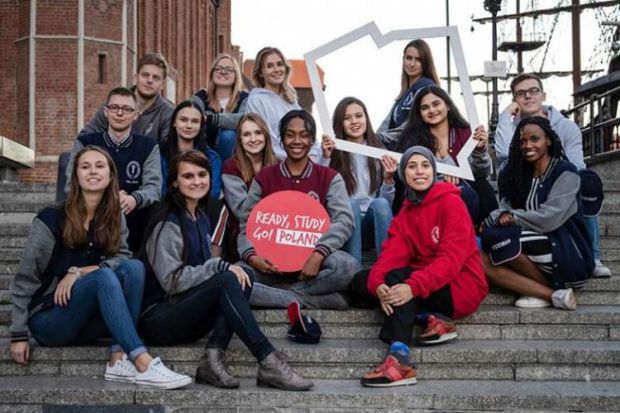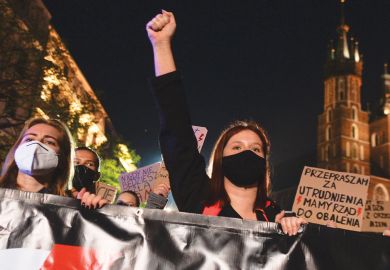More international students from Africa and central Asia are heading to Poland for the first time as the war in Ukraine resets student traffic flows.
While traditionally a minor player in international education, the eastern European country has been forced to diversify its student intakes because of declines in the number of domestic students, from about 1.8 million to 1.2 million in the period 2010 to 2020.
In 2021, Poland recorded a modest inflow of about 89,000 international students, more than 40 per cent of whom came from Ukraine. Restrictions preventing men of fighting age from leaving this country since the Russian invasion began have forced Polish universities to look further afield. Those who would once have studied in Ukraine are also looking to Poland instead, university leaders said.
Jerzy Lis, chair of the internationalisation committee at KRASP, the Polish rectors’ conference, told Times Higher Education that applications from Africa and central Asia were both on the rise. “Africa is now looking to Poland or central Europe as a more interesting place for study, so we see an increasing number of candidates from Zimbabwe, from Rwanda, from South Africa,” he said.
Data collated by the Perspektywy Foundation, which runs the Study in Poland recruitment programme, show that intakes from Uzbekistan have grown from about 300 to 3,000 in five years. With recruitment fairs in Tashkent and Samarkand in April, universities that THE spoke to are hoping to continue the trend.
Marcin Witkowski, who works in international outreach at Adam Mickiewicz University, Poznań (AMU), said nationalities where the Russian language was commonly understood – including Belarus, Russia, Kazakhstan, Azerbaijan and Uzbekistan, among others – now make up about 40 per cent of its international intake.
A shift can also be seen at the Medical University of Bialystok (UMB). Tomasz Maliszewski, head of its international relations department, said its intake had gone through a series of major changes. From 2020, cohorts previously dominated by western European students had been joined by students from India for the first time, and as that group grew in subsequent years it was bolstered by students from Pakistan and Bangladesh.
Dr Maliszewski said the “biggest changes” had occurred in the current academic year: international enrolments were now spread across 40 countries, and half of that intake was from outside Europe, largely because of the conflict. “Many students from African countries have studied in Ukraine. After the outbreak of war, Poland became a natural alternative destination for them.”
Tomasz Hryszko, the UMB rector’s lead for international cooperation, said the tuition fees for its medical degrees, about €13,000 (£11,500) a year, had long been attractive to western European applicants because they compare favourably with those of rivals elsewhere in the European Union. But he added that the prospect of an EU medical degree, which is recognised in the US, could also draw in applicants from Asia.
Mr Witkowski said AMU’s recruitment for 2023 would focus less on Africa and more on south-east Asia and western Europe to help fill its English-language programmes, which have fees of up to €1,000 a year (£892). But AMU’s success in teaching Polish to incoming students, he continued, meant that it could attract students to any of its courses – 90 per cent of which are in Polish. “In that sense, we are not dependent on Ukraine or any other country as a potential source for recruiting candidates.”
Having actively recruited from Ukraine for years, AMU was well set up to accommodate those who have enrolled since the war began. “We would also wish for everyone who desires it to be able to come back home, to a peaceful and safe Ukraine, once the Russian aggressors are driven out once and for all. Let all international students enjoy their university time without the sword of Damocles hanging over their heads.”
Register to continue
Why register?
- Registration is free and only takes a moment
- Once registered, you can read 3 articles a month
- Sign up for our newsletter
Subscribe
Or subscribe for unlimited access to:
- Unlimited access to news, views, insights & reviews
- Digital editions
- Digital access to THE’s university and college rankings analysis
Already registered or a current subscriber?








